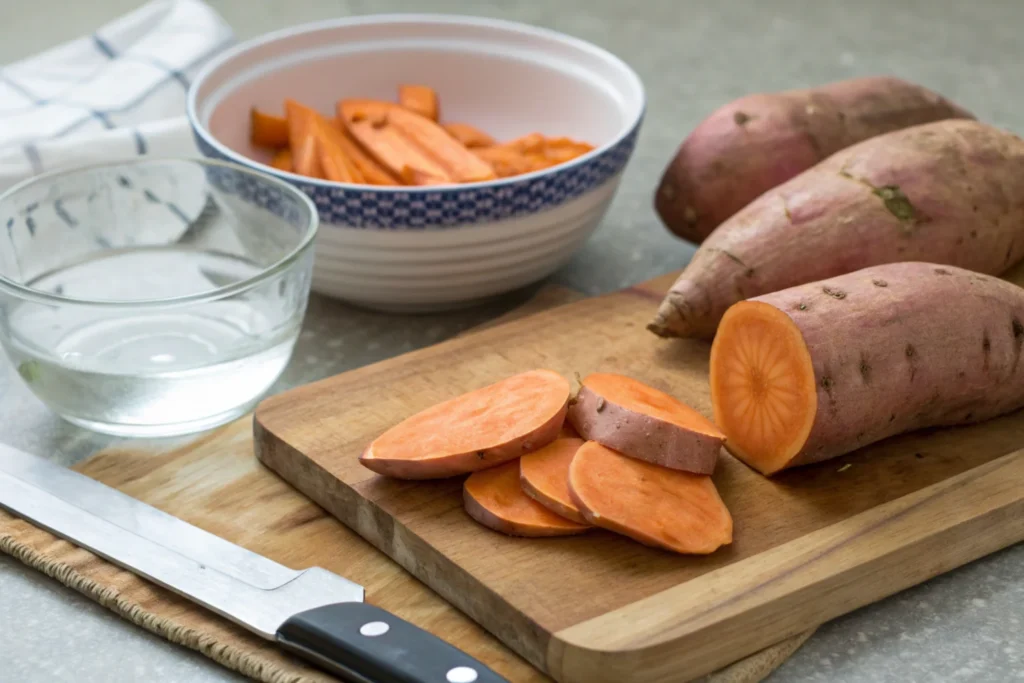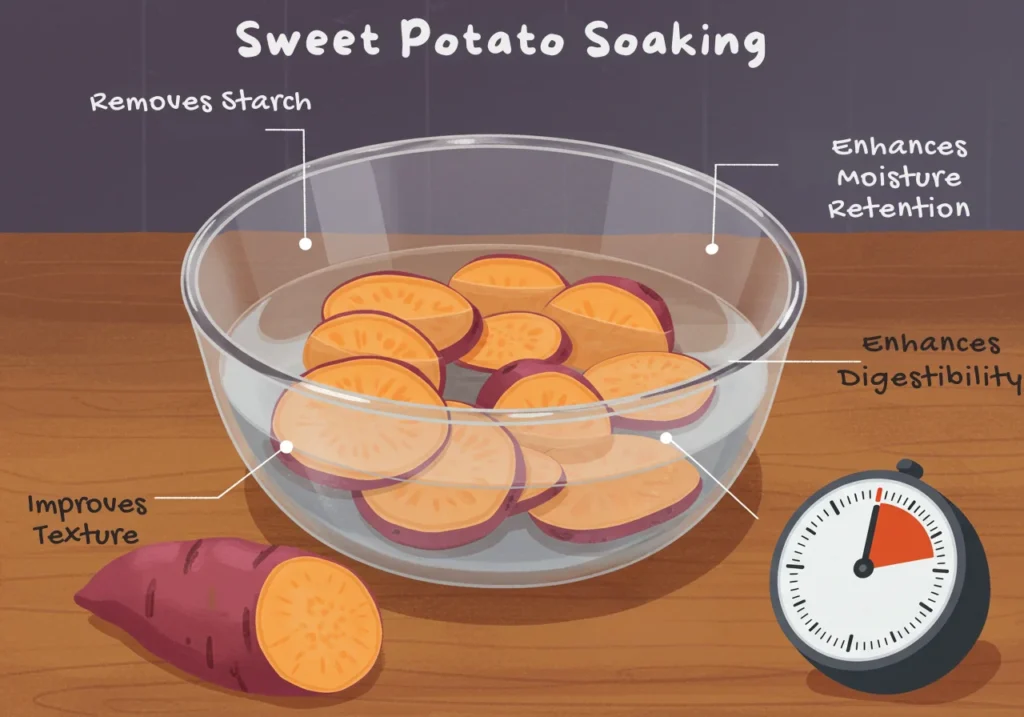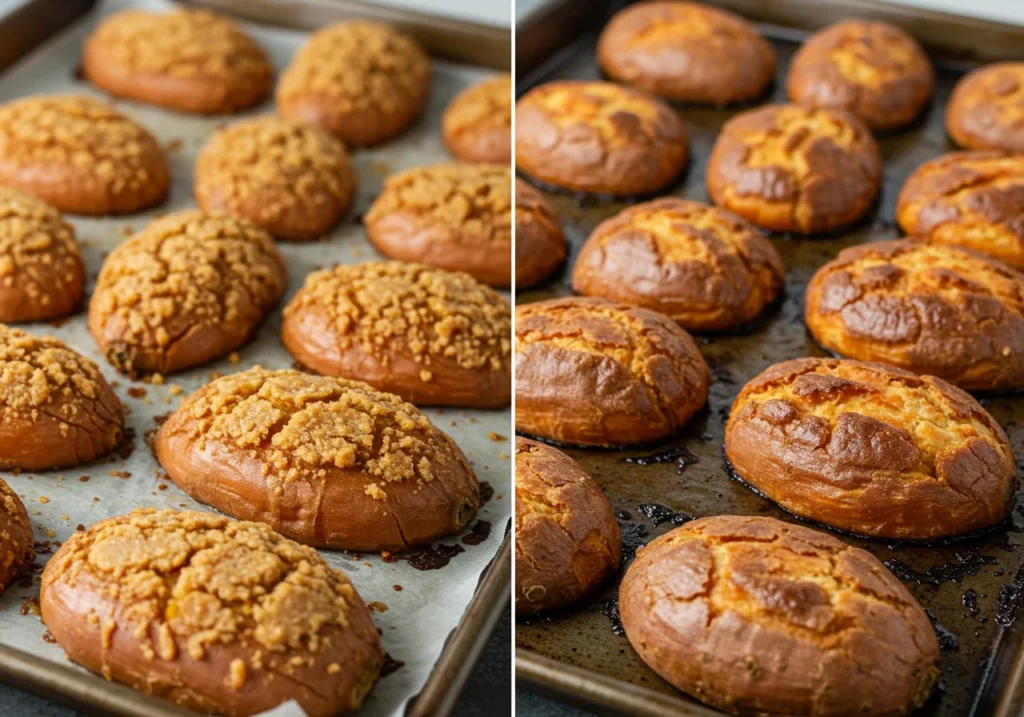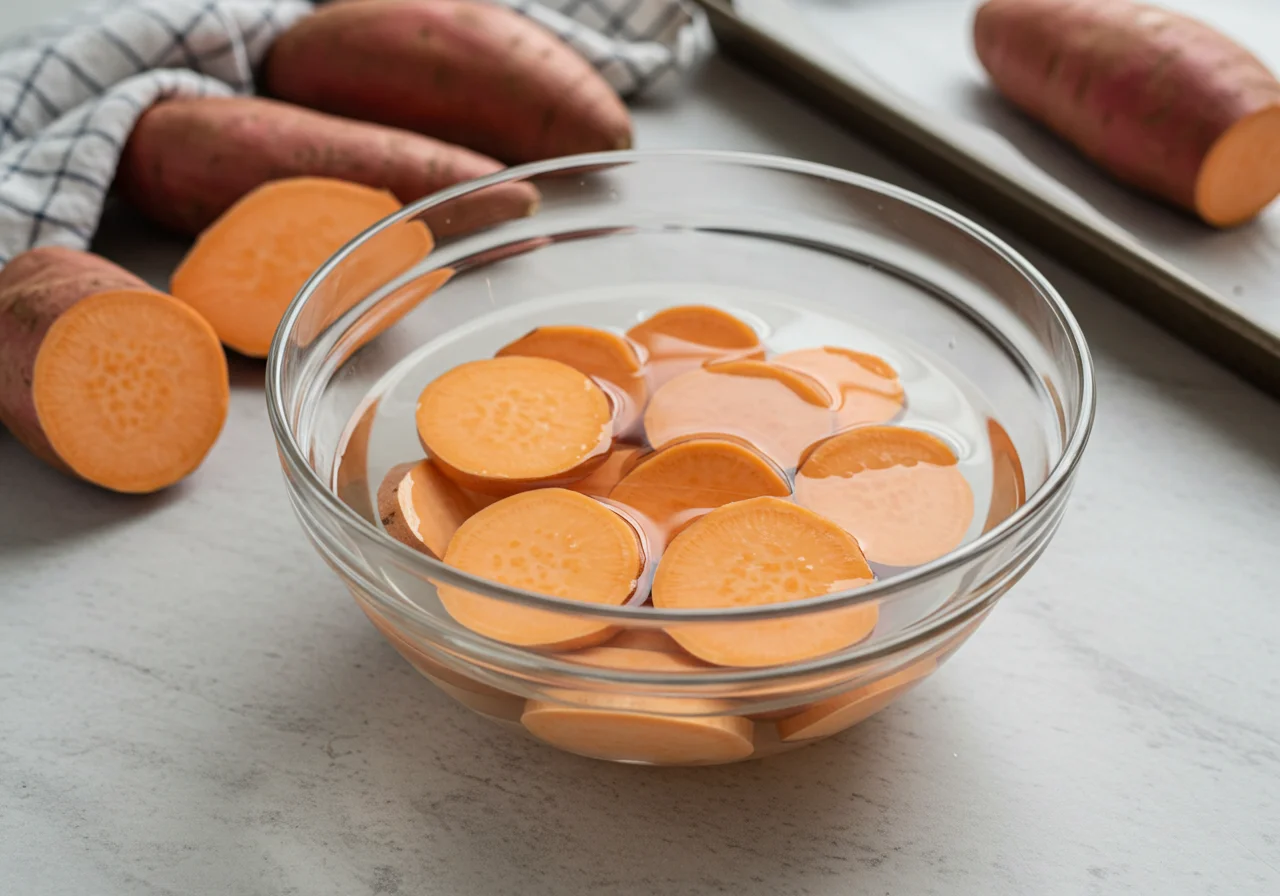Introduction
Baking sweet potatoes can turn a simple vegetable into a mouthwatering delight, but have you ever wondered why do you soak sweet potatoes before baking? This article dives into the science, benefits, and methods behind this essential preparation step, helping you achieve the perfect texture, taste, and crispiness. We’ll also address common concerns, share practical tips, and answer frequently asked questions about this versatile root vegetable. Whether you’re a kitchen novice or a seasoned cook, you’ll find valuable insights to make your sweet potato dishes shine.
The Science Behind Soaking Sweet Potatoes
Why Soaking Sweet Potatoes Matters

Soaking sweet potatoes before baking isn’t just a trendy tip—it’s backed by simple science. But why do you soak sweet potatoes before baking? Sweet potatoes are naturally packed with starch, and while that starch plays a role in their structure, it can also interfere with their baking process. Excess starch on the surface traps moisture, leading to uneven cooking and preventing that delightful crispiness many of us crave. By soaking, you loosen and remove some of this starch, allowing the sweet potatoes to bake more evenly and develop a crisp, caramelized exterior.
Another reason soaking matters is hydration. During baking, sweet potatoes tend to lose moisture, which can lead to a dry, less appealing texture. Soaking them beforehand allows the potatoes to absorb water, helping them stay moist even under high heat. This is especially important for dishes like fries or chips, where texture is key.
Whether you’re aiming for perfectly crisp fries or tender roasted cubes, soaking sweet potatoes transforms the way they bake and taste. And if you’ve ever wondered why do you soak sweet potatoes before baking?, the answer lies in balancing starch removal and moisture retention to achieve the best results.
The Role of Water in Sweet Potato Texture and Taste

Water isn’t just a passive player in the soaking process—it actively enhances the baking experience. So, why do you soak sweet potatoes before baking? When sweet potatoes sit in water, they absorb enough moisture to soften their outer layer. This softening helps heat penetrate more evenly during baking, which is why soaked sweet potatoes often bake faster and more consistently than unsoaked ones. By incorporating this step, you create the foundation for a perfectly baked dish, whether you’re making fries, chips, or roasted cubes.
Additionally, soaking creates the ideal conditions for caramelization. Sweet potatoes are naturally rich in sugars, and when they bake, these sugars break down to form a golden, flavorful crust. Soaking aids this process by washing away excess starch that could otherwise block caramelization. The result? Sweet potatoes that are not only visually appealing but also rich in flavor and texture.
For those who enjoy experimenting with different baking techniques, soaking can also improve the way sweet potatoes absorb seasonings. Water hydrates the surface, allowing spices and oils to stick more effectively. This means each bite is bursting with the flavor you’ve carefully added before baking.
How Starch Content Affects Baking Outcomes
Starch is a double-edged sword in sweet potatoes. On one hand, it contributes to their firmness and structure; on the other, it can hinder their ability to bake evenly. When starch remains on the surface, it forms a barrier that locks in moisture, causing the sweet potatoes to steam rather than roast.
Soaking breaks down this barrier, allowing the sweet potatoes to cook thoroughly from the inside out. For sweet potato fries or chips, where a crispy exterior is essential, soaking is particularly crucial. It ensures that every piece bakes to the same level of perfection, with a golden crust and a soft, fluffy center.
Whether you’re baking whole sweet potatoes, fries, or wedges, understanding the role of starch helps you see why soaking sweet potatoes before baking is such a game-changer. With just a bowl of water and a bit of time, you can elevate this humble vegetable into a culinary masterpiece.
Benefits of Soaking Sweet Potatoes Before Baking
Enhanced Crispiness and Texture After Baking

One of the most talked-about benefits of soaking sweet potatoes before baking is the delightful crispiness it provides. By soaking, you remove some of the surface starch that can otherwise hold onto moisture. This helps the sweet potatoes crisp up beautifully in the oven while maintaining their soft, fluffy interior. If you’re aiming for a golden, crunchy exterior on your baked sweet potato fries or chips, this step is absolutely crucial.
The process also promotes a more uniform texture, ensuring that each bite is consistently tender inside, making it a game-changer for both flavor and presentation.
Even Cooking and Better Heat Distribution
Soaking allows sweet potatoes to absorb a bit of water, which evens out their cooking process. Dry spots, which are often the result of uneven baking, are less likely when the sweet potatoes have been adequately prepped. This ensures that all sections cook at the same rate, giving you evenly roasted, perfectly done sweet potatoes every time.
Moreover, soaking enhances the sweet potato’s ability to caramelize during baking. The water content, combined with their natural sugars, helps create a flavorful, caramelized coating that elevates the dish.
Nutritional Impacts of Soaking Sweet Potatoes
While soaking sweet potatoes, you may lose a small amount of starch and water-soluble nutrients, but the gains far outweigh this minor downside. By improving the baking process, you preserve more of the vitamins and minerals inside, especially since soaking helps the sweet potatoes bake faster and more evenly. This is a win for both taste and health!
For more detailed insights on enhancing vegetable preparations, you might find Haven of Recipes helpful.
Step-by-Step Guide to Soaking Sweet Potatoes Properly
How Long Should You Soak Sweet Potatoes?
Timing is everything when soaking sweet potatoes. Ideally, soak them for at least 30 minutes, though longer soaks—up to 24 hours in the refrigerator—can provide even better results, especially for dishes like fries or chips. If you’re short on time, even a quick soak of 15 minutes can still make a difference in the final texture.
Best Practices for Preparing Sweet Potatoes for Soaking
Start by thoroughly washing the sweet potatoes to remove dirt and debris. Then, slice them into your desired shape, whether that’s wedges, rounds, or sticks. The smaller and thinner the slices, the more effective the soaking will be at removing starch. Use cold water to soak, as it helps retain the sweet potato’s natural firmness.
Once soaked, be sure to pat them dry with a clean towel. Excess moisture can lead to steaming instead of crisping when baked.
Common Mistakes to Avoid When Soaking Sweet Potatoes
- Skipping the soak entirely: This can leave you with unevenly cooked sweet potatoes.
- Using hot water for soaking: This can prematurely cook the sweet potato’s exterior, leading to inconsistent results.
- Not drying the slices properly: Moisture left on the surface can prevent crisping and result in a soggy texture.
Following these steps ensures you’ll achieve the best possible outcome when baking sweet potatoes.
What Happens If You Skip Soaking?

Impact on Sweet Potato Texture and Flavor
Skipping the soaking step might save time, but it can lead to less-than-ideal results. Without soaking, the excess starch on the surface of the sweet potatoes remains intact. This can cause the slices to bake unevenly, resulting in a chewy or gummy texture. Additionally, the natural sugars in the sweet potatoes might not caramelize as effectively, leaving your dish lacking that rich, roasted flavor.
If you’re aiming for crisp edges and a creamy interior, soaking is the way to go. Otherwise, you might end up with sweet potatoes that are bland and dry.
Why Unsoaked Sweet Potatoes May Stay Hard
Have you ever pulled sweet potatoes out of the oven, only to find they’re still frustratingly hard? This often happens because the starch content acts as a barrier, preventing moisture from penetrating during baking. Soaking softens the surface and helps the sweet potatoes absorb heat more evenly. Skipping this step can result in undercooked centers, even if the outsides appear done.
For a foolproof method, take a little extra time to soak your sweet potatoes. It’s a simple step that ensures every piece bakes to perfection.
Potential Baking Challenges Without Soaking
Without soaking, you may face issues like:
- Uneven baking: Some pieces might cook faster than others.
- Soggy texture: Excess starch can trap moisture, leading to soggy sweet potatoes.
- Burnt edges: Unsoaked sweet potatoes are more prone to burning before they’re fully cooked.
If you’re eager to explore more tips for getting the best out of your vegetables, you can find additional insights on sites like Haven of Recipes.
Other Ways to Enhance Sweet Potato Baking Results
Using Other Pre-Baking Techniques
While soaking is highly effective, there are other techniques you can combine for even better results. Parboiling sweet potatoes for a few minutes can reduce baking time and help them caramelize faster in the oven. Similarly, tossing them in a bit of cornstarch before baking can add an extra layer of crispiness.
Using these additional methods can complement soaking, giving you sweet potatoes that are crispy, flavorful, and perfectly cooked.
Balancing Soaking with Other Cooking Methods
If you’re making sweet potato fries, consider soaking and then air-frying them. This combination provides the ideal mix of a crispy exterior and a soft, tender interior. For roasted sweet potatoes, you might pair soaking with seasoning techniques that highlight the natural sweetness of this versatile vegetable.
Balancing soaking with other methods ensures you’re making the most of your time and effort in the kitchen.
The Role of Seasoning and Oil in Sweet Potato Baking
Seasoning is just as important as soaking when it comes to creating a flavorful dish. A simple mix of salt, pepper, and a touch of cinnamon can enhance the natural sweetness of the potatoes. Tossing them in olive oil or avocado oil before baking also helps promote crispiness while locking in moisture.
For a step-by-step recipe on achieving perfectly seasoned baked sweet potatoes, consider checking out related articles on Haven of Recipes.
FAQs About Sweet Potatoes and Soaking
Should I Soak Sweet Potatoes Before I Bake Them?
Absolutely! Soaking sweet potatoes before baking is a simple yet effective way to enhance their texture and flavor. By soaking, you reduce excess starch, which can otherwise lead to uneven cooking or soggy results. This step is especially useful if you’re making sweet potato fries or chips, as it helps them crisp up beautifully in the oven.
If you’ve been wondering why do you soak sweet potatoes before baking?, it’s all about achieving that perfect balance between crispy outsides and tender insides.
What Happens If You Don’t Soak Sweet Potatoes?
Skipping the soak may save time, but it could leave you with underwhelming results. Unsoaked sweet potatoes are more likely to bake unevenly, stay hard in the center, or lack that sought-after crispiness. Plus, the starch that clings to their surface can prevent them from caramelizing properly, resulting in a less flavorful dish.
If you’re short on time, even a quick 15-minute soak can make a noticeable difference in the final outcome.
Why Are My Sweet Potatoes Still Hard After Baking?
If your sweet potatoes remain hard after baking, it’s often due to insufficient moisture absorption. Soaking helps soften the outer layer, allowing heat to penetrate evenly. Without this preparation, the natural starch content can act as a barrier, leaving the center undercooked.
Next time, try soaking your sweet potatoes for at least 30 minutes before popping them into the oven.
Why Won’t My Sweet Potato Chips Get Crispy?
Achieving crispy sweet potato chips can be tricky without proper preparation. Excess starch on the surface can trap moisture, leading to soggy chips. Soaking is key to removing this starch, creating the perfect conditions for a crispy finish.
Don’t forget to pat the slices dry thoroughly after soaking and spread them out evenly on the baking tray to prevent steaming.
Conclusion: Why Soaking Sweet Potatoes Is Worth It
Summarizing the Benefits of Soaking
Soaking sweet potatoes before baking might seem like an extra step, but it’s well worth the effort. From reducing excess starch to ensuring even cooking, soaking helps you achieve sweet potatoes that are crisp on the outside and soft on the inside. Plus, it makes them easier to season and caramelize, adding layers of flavor to every bite.
If you’ve ever asked yourself why do you soak sweet potatoes before baking?, the answer lies in creating a dish that’s not only visually appealing but also irresistibly delicious.
Key Tips for Perfectly Baked Sweet Potatoes
To make the most of your sweet potato baking:
- Always soak your sweet potatoes, even if only for a short time.
- Experiment with seasoning to complement their natural sweetness.
- Use high-quality oils to enhance crispiness and flavor.
With these tips, you’ll be able to transform sweet potatoes into the star of your meal, every time.

